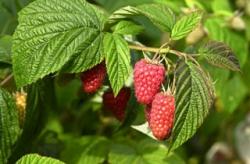Raspberries Are A Delicious Way To Heart Health
November 13, 2009 | 2 min to read

Recent research from the University of Glasgow, Scotland and the University of Montpellier, France shows that eating the equivalent of one serving (1 cup) of raspberries daily may help prevent the development of early atherosclerosis (artery hardening) and lead to improvements in heart health.
The study, supervised by Dr. Jean-Max Rouanet of the University of Montpellier in France, with Dr. Alan Crozier of the University of Glasgow, Scotland, showed that hamsters fed raspberry juice had reduction of up to 95% in aortic lipid deposition (fat in the arteries) after 12 weeks.
Syrian hamsters are the ideal test subjects for a study related to heart health because, when fed a fat-rich diet, their cholesterol levels increase and they develop fatty streaks in their arterial walls, much as humans do but in a matter of weeks rather than over many years.
Along with a high-fat diet, the hamsters also received one of five different high antioxidant liquids: raspberry juice, strawberry juice, bilberry juice and green or black tea over a 12 week period. While all the liquids showed some benefits, the raspberry juice and green tea were the most effective.
According to Crozier, “Our findings from these animal tests suggest that, as a part of a healthy diet, raspberries and raspberry juice, green tea, as well as to a lesser degree other berry juices and black tea, may reduce the incidence of heart disease in humans.”
Other nutrition research currently underway is also showing promise for the regular inclusion of raspberries as a part of a heart-healthy diet. Initial results of animal tests at Tufts University in Boston show cognitive benefits from the consumption of raspberries in amounts equivalent to one human serving (1 cup whole fruit) daily. Another study, this time with humans, at the University of Toronto indicates that raspberries provide several of the phytochemicals -anthocyanins, hydrolysable tannins, phenolic acids,cyanidin and ellagic acid – which have possible health benefits for the prevention of cancer, cardiovascular diseases, diabetes, obesity, neurodegenerative disease and aging. Other preliminary research indicates that raspberries are a potent anti-inflammatory.
Raspberries rank in the top 10 of anti-inflammatory fruits. One serving (1 cup) of raspberries has only 70 calories but provides 50% of a day’s requirement for vitamin C, 32% of fiber, 6% of folate, 6% of magnesium, 5% of potassium and 4% each of calcium, niacin, B6, phosphorus and zinc . That 1 cup serving has only 1 gram of fat, no saturated or transfats, no cholesterol and no sodium.
Consumer research has shown that raspberries are one of US consumers’ most popular fruits, second only to strawberries. That same research, conducted among 1500 consumers nationwide, also showed that consumers are equally pleased to purchase fresh or frozen raspberries and appreciate the versatility of the fruit in fresh or frozen form or as an ingredient in juice blends, baked goods, yogurt and other products.
All this information is good news to the Washington Red Raspberry Commission, a state organization of raspberry growers and processors. Washington State grows 60% of the country’s red raspberries and almost 95% of the raspberries for processing: individually quick frozen (IQF) berries; jams and preserves, concentrates; purees and special forms for ingredients in other food products found throughout supermarkets and on restaurant menus.
The Commission, representing more than family farms in the state, continues to put a major portion of its funding into nutrition research.
Source: Washington Red Raspberry Commission
